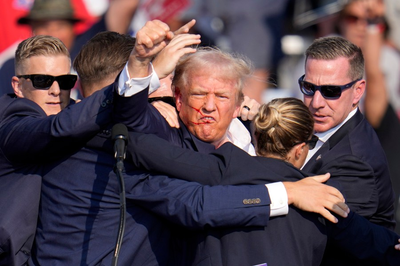
WASHINGTON (AP) — A congressional task force investigating the attempts to kill Donald Trump during his presidential campaign is recommending changes to the Secret Service, including protecting fewer foreign leaders during the height of election season and considering moving the agency out of the Homeland Security Department.
The 180-page report by the bipartisan task force released Tuesday is one of the most detailed looks so far into the July assassination attempt against Trump during a campaign rally in Pennsylvania and a second attempt in Florida two months later.
Like the series of other investigations and reports, the task force railed at the agency tasked with protecting the top echelon of America's democratic leaders.
“The events of July 13, 2024, were tragic and preventable, and the litany of related security failures are unacceptable," the authors wrote. "The Secret Service’s zero fail mission allows no margin for error, let alone for the many errors described in this report."
In the July shooting, a gunman opened fire from the roof of a nearby building, wounding Trump in the ear, killing one rallygoer and wounding two others. He was killed by a countersniper.
In another assassination attempt in September, a gunman waited for hours for Trump to appear at his golf course in Florida, but a Secret Service agent thwarted the attack by spotting the firearm poking through some bushes.
Here are the highlights of the new report and its recommendations:
Reducing the number of people protected — specifically foreign leaders
The report's authors noted that the number of people the agency is tasked with protecting has “greatly expanded.” At the same time, the presidential campaign season is getting longer and more intense.
The agency is also tasked with protecting foreign dignitaries during the U.N. General Assembly, when heads of state and government flood into New York. That event happens every September, which comes at the “height of campaign season,” the report noted, adding to the agency's staffing crunch.
"Congress, DHS, and the USSS should jointly consider the protective role the USSS plays for foreign leaders and consider whether such duties can be transferred or abrogated in order to focus on the USSS’s primary duty: to protect the President and other critical U.S. leaders,” the report said.
Drop some investigative work, especially during elections
The Secret Service is known for its high-profile work of protecting the president, the vice-president, presidential candidates, their families and others.
But agents also carry out a wide range of investigations not related to their protective mission — investigating fraud and financial crimes, for example. Stemming from when the agency was part of the Treasury Department, those investigations are an important part of training Secret Service officers for skills they'll need on protective details, agency leaders say.
But the task force recommended reviewing these investigative responsibilities — especially during campaign season — so the agency "can prioritize the protection of U.S. leaders and candidates running for office."
“These non-protective, investigative functions require systemic review because of the USSS’s stunning failure to protect President-elect Trump on July 13,” the report said. “The Secret Service’s protective mission is at the core of the agency’s purpose — anything that distracts or diverts resources from the agency’s zero fail mission must be reconsidered.”
Questioning whether the Secret Service should stay in the Homeland Security Department
After DHS was created in the aftermath of the Sept. 11, 2001, attacks, the Secret Service was moved there from the Treasury Department.
The task force suggested reevaluating that move. During the time Secret Service has been in the Homeland Security Department, “USSS has not benefited from stable leadership,” the lawmakers said.
They said the structure “potentially weakens USSS, a small but critically important agency, in advocating for its budget and other priorities inside a much larger entity.”
“A fresh look at whether USSS might benefit from the status of an independent agency, with more freedom to make budget requests and advocate for itself, would be a healthy discussion for former USSS leaders to have with Congress,” the task force said.
Staffing problems
The task force said the gunman in Butler, Pennsylvania, Thomas Crooks, exploited gaps in protection because of a lack of assets and staff.
Specifically, the panel noted that the Secret Service, already dealing with the increased tempo of a presidential campaign, was protecting not one but two high-profile people that day in close vicinity to each other, with first lady Jill Biden at a nearby event.
In one example highlighting the lack of resources at the Trump rally, the task force said there should have been a counter-surveillance unit in Butler, and if there had been one assigned that day, it might have spotted the shooter earlier.
Such a counter-surveillance team was in place for the Biden event, the report noted, although that event was indoors.
“From interviews with special agents on the ground, it appears that the main factor in the decision to not request (the counter-surveillance unit) was an assumption that the request would be denied due to the protectee’s status as a former President at the time of the event,” the report said.
Pointing to bad communications and faulty planning
Much of the criticism in the aftermath of the July assassination attempt has centered on how the shooter could have gotten access to a roof with a clear line of sight to Trump and why there was such poor communications between the Secret Service and local law enforcement.
The Secret Service often relies on local law enforcement to secure large events. The report detailed how local law enforcement had one idea of its responsibilities while the Secret Service had another.
But the task force emphasized that ultimately the Secret Service is responsible for ensuring that coordination runs smoothly.
“The Secret Service must own responsibility for the security of the site,” the report said.